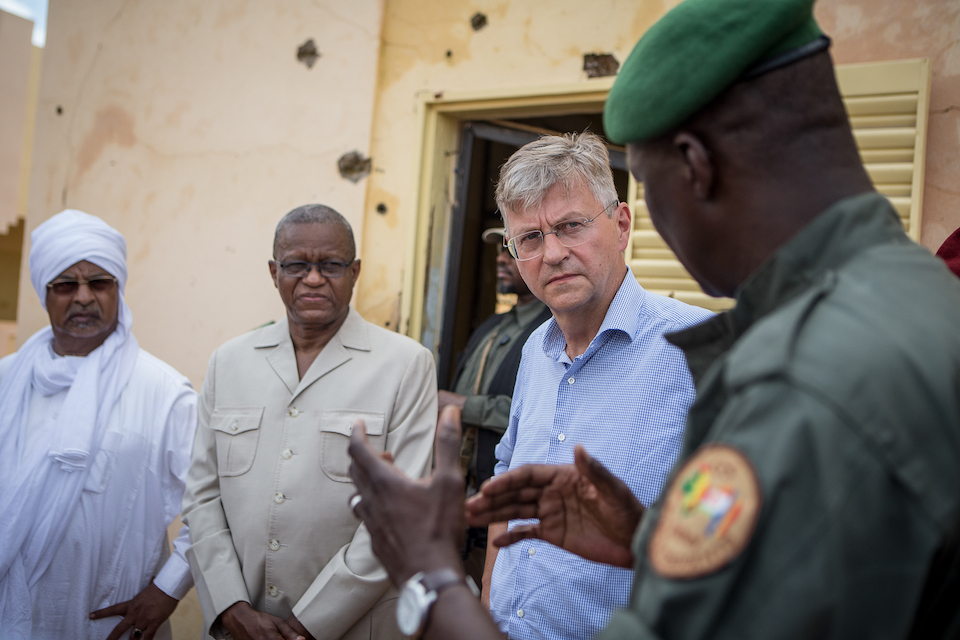Addressing the long-standing causes of instability in the Sahel
Statement by Ambassador Jonathan Allen, UK Deputy Permanent Representative to the United Nations, at the Security Council Briefing on the Group of Five for the Sahel

Thank you Mr President and may I also thank our briefers today.
Mr President, the challenges facing the Sahel region are complex and becoming progressively more so. The United Kingdom is concerned by increasing incidents of terrorism, criminality and intercommunity violence in Mali’s central regions, and we share the Secretary-General’s concerns about the spread of insecurity and terrorism to other parts of the region, including into eastern Burkina Faso.
Mr President, many of our speakers and briefers today have talked about the importance not only of security - although that is key - but of the development and of the wider economic development and provision of services required.
In this region, we have our Agenda 2030 in action. It is not one single element which will ensure success, but all are needed. So there are economic and social issues which go back decades which underpin the instability in the Sahel. Our development work must address these long-standing causes of the instability we see, also emphasising individual rights. The G5 Sahel Force needs to tackle terrorism and to create the space for governments and international organisations to safely deliver services. MINUSMA of course is a crucial component of assisting governments in holding that space. And in particular in Mali, we need a recommitment and focus on the peace process. So all these components are not only individually but collectively vital, and it is the core task of all of those in a leadership role - whether that’s in New York, in Nouakchott, or on the ground - to ensure that these efforts are joined up, are sequenced and are effective. And it would help this Council if we could hear more about those joint activities in practice as well as in theory.
Mr President, as the Secretary-General’s report set out, there is clear progress to applaud. We recognise the leadership and the personnel of the G5 Sahel states for continuing their efforts to unite and work together despite difficult and adverse circumstances. And the United Kingdom is particularly encouraged by the successful deployment of troops and the conduct of six Joint Force operations on the boundary zones. The full operationalisation of the three Sector Headquarters and the launch of the G5 Sahel Security and Defence College. And we recognise the bravery and dedication of G5 Forces and what Jean-Pierre Lacroix described as an alarming security situation.
We are also pleased to see the update on the human rights and international humanitarian law framework. The United Kingdom emphasises the importance of operations the G5 Sahel Joint Force being conducted in full compliance with international law, including international humanitarian law and international human rights law. And we welcome the steps already taken to advance the compliance framework and encourage continued efforts to embed and operationalise this across the G5 Sahel Force. Civilian protection, operationalisation of this framework is vital to maintaining the support and consent of the populations the Joint Force was created to protect.
Mr President, moving forward, we would encourage the G5 Sahel Secretariat to finalise the Joint Force’s strategic concept of operations, which will both demonstrate unity of purpose within the Joint Force and boost donor confidence. And we call upon G5 Sahel countries to expedite their efforts to deploy all outstanding troops and to fully establish the police component in order to address the growing trans-border threat that the region is facing.
I welcome Mr Sidikou’s bluntness earlier. We also strongly urge all partners to make good on the financial commitments they have made to the G5 Sahel Joint Force as soon as possible in order to ensure that it becomes even more of a reality as quickly as it can.
And the United Kingdom reiterates its support for the G5 Sahel Joint Force. To support this the UK has contributed 15.5 per cent of the European Union’s package of support to the G5 Sahel Joint Force. We’ve pledged 2 million pounds in bilateral support to the Joint Force and we’ve deployed three Chinook helicopters to the Sahel to support Operation Barkahne. This is on top of around $200 million which has gone to the Sahel in development and humanitarian assistance over 2018 to 2019.
The UK recognises the contribution of regional actors which are working towards stability in the Sahel, including MINUSMA, Operation Barkahne, and the EU missions, and supports the technical assistance and training these actors are providing. In order to ensure them maximum impact of these various stabilisation efforts and to avoid duplication, enhanced coordination is key, and we commend the role of the European Union in managing the coordination hub to date and recognise its intention to transfer the coordination hub to the G5 Sahel once it has the capacity to receive and host it. To this end, we strongly urge the G5 Sahel to accelerate the establishment of the Groupe de Soutien which will serve as a platform for exchanges and coordination with national, regional and international partners.
Mr President, I made clear earlier that military action alone is not the solution and set out some of what the UK has done to that end. And with that in mind we welcome the recalibration of the United Nations Integrated Strategy for the Sahel and the launch of the UN Support Plan. This provides an important framework to address the structural impediments, development peace and security in the region in a more integrated manner on issues in the Sahel, which as I said before going back decades. We also welcome the role that the Peacebuilding Commission continues to take in mobilising commitments and partnerships between the UN system, between countries in the Sahel, other international, national and regional partners with a view to advancing the implementation of the integrated strategy.
Thank you Mr President.